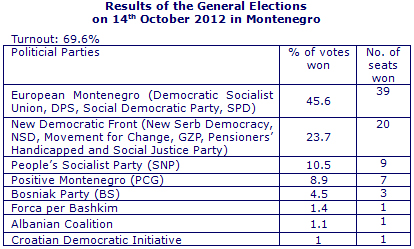Results
News
Corinne Deloy,
Fondation Robert Schuman,
Helen Levy
-

Available versions :
EN

Corinne Deloy
Fondation Robert Schuman
Helen Levy
Unsurprisingly the "For a European Montenegro" formed by the Democratic Union of Socialists (DPS) of outgoing Prime Minister Igor Luksic, led by former Head of Government (2003-2010) Milo Djukanovic, and the Social Democratic Party (SDP) led by Ranko Krivokapic – two parties allied in power since 1998 –, won the general elections that took place six months early on 14th October in Montenegro. It won 45.6% of the vote taking 39 seats in the Skupstina, the only chamber in Parliament. For the first time in 11 years the coalition did not win the absolute majority however. This is due in part to the recent changes that have been made to the electoral law, which now allows the parties representing the national minorities to stand alone for the suffrage of the electorate. "The decline of the Democratic Union of Socialists is obvious. The electorate is not prepared to accept the same messages anymore and to support the coalition in office. From now on the opposition has a chance," declared Zlatko Vujovic, director of the Center for Monitoring (CEMI), explaining why it did not win the absolute majority.
The New Democratic Front led by former Foreign Minister Miodrag Lekic, that rallies Andrija Mandic's New Serb Democracy (NSD), the Movement for Change (GZP) led by Nebojsa Medojevic, and the Pensioners', Handicapped and Social Justice Party, won 23.7% of the vote and 20 seats. The People's Socialist Party (SNP), led by Srdjan Milic won 10.5% of the vote and 9 seats. Positive Montenegro (PCG), the new centre-left party founded last May by Darko Pajovic, won 8% of the vote and 7 seats. Together the parties representing the country's minorities won 6 seats. This year the latter were allowed to put specific candidate lists forward, a measure that was reserved to the Albanian community only in the past. The Bosniak Party (BS) won 4.5% of the vote and three seats and the Albanian Party Forca per Bashkim, 1.4% of the vote. Finally the Albanian Coalition (1.1%) and the Croatian Democratic Initiative (HGI) each won a seat.
Turnout totalled 69.60%, ie 3.41 points above the rate registered in the last general elections on 29th March 2009.
The election on 14th October followed the dissolution of Parliament approved on 26th July last. The government in office said it wanted the country to be able to move forwards towards EU membership as it requested a further four year mandate. Montenegro became an official candidate on 17th December 2010, two years after it had delivered its request. Membership negotiations led by Podgorica with the 27 opened on 29th June last.
 Source: Agence France Presse
Source: Agence France Presse
"It is a major victory. The coalition in office in Montenegro is one of the rare ones in Europe to have retained the confidence of the electorate in these difficult times of crisis," declared Milo Djukanovic when the results were announced. Before the election he said that he wanted the Montenegrins to vote "in support of the maintenance of Montenegro's stability, of economic recovery and the continuation of the road towards European integration and NATO." The coalition he was leading "For a European Montenegro" also chose the slogan "Naprijed Crna Goro" (Forwards Montenegro!) as its campaign slogan. "The stakes are high. Six years after our independence our State is still fragile and we have to strengthen it," he added.
Aged 50, Milo Djukanovic became the president of the Montenegrin government with the consent of the then Serb President Slobodan Milosevic (Socialist Party of Serbia, SPS) in 1991. He retained the seat until 1998, when he was elected the President of the Republic, a post he occupied until 2006. Until 1996-1997, the two men shared the same positions until Milo Djukanovic distanced himself from the Serb leader. At the same time he started to claim the independence of Montenegro. He saw his dream come true on 21st May 2006, the day when the Montenegrins said "yes" by a 55.4% majority to its independence from Serbia. He then quit as head of government in November after the first general elections in independent Montenegro, which were however won by the Democratic Union of Socialists. In 2008 he returned as head of government after the resignation of Zeljko Sturanovic (DPS) for health reasons. He resigned on 21st December 2010 some days before Montenegro achieved the status of candidate for EU membership.
In all likelihood Milo Djukanovic should become head of government after these elections. "As of tomorrow we shall begin forming the government which will take Montenegro towards the EU," he declared, without saying however whether he would take up the post of Prime Minister.
On the same theme
To go further
Elections in Europe
Corinne Deloy
—
4 November 2025
Elections in Europe
Corinne Deloy
—
28 October 2025
Elections in Europe
Corinne Deloy
—
14 October 2025
Elections in Europe
Corinne Deloy
—
7 October 2025

The Letter
Schuman
European news of the week
Unique in its genre, with its 200,000 subscribers and its editions in 6 languages (French, English, German, Spanish, Polish and Ukrainian), it has brought to you, for 15 years, a summary of European news, more needed now than ever
Versions :



